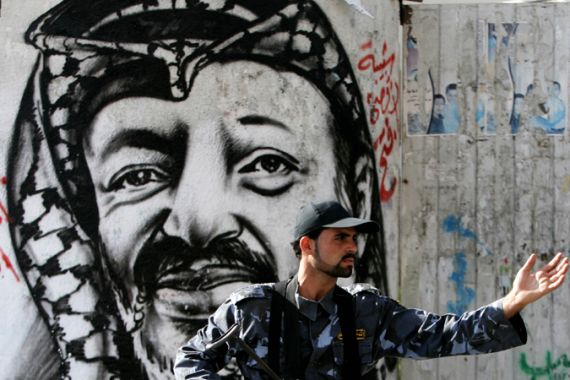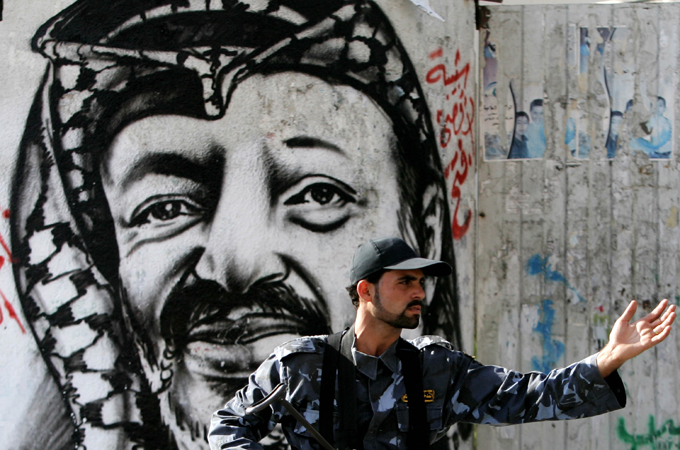What Palestinian state?
Most Palestinians wonder what would actually change ‘on the ground’ if the UN grants Palestine statehood.

 |
| Palestinians differ about whether the bid for statehood will change the situation ‘on the ground’ [GALLO/GETTY] |
For the past few weeks, a world of analysts and academics has been fretting and strutting hypotheses about the PLO’s state-declaring endeavors at the UN. Across the pages of esteemed broadsheets, verbally diarrhetic blogs, and well-crafted op-ed sites, they bandy questions about the political and legal fall-out of this manoeuvre.
Will it be a declaration of a “state”? Or something that may quack and waddle like a state but doesn’t have quite enough feathers to fly like a state?
With its focus on the 1967 borders, has the Palestinian Authority (PA) finally fully succumbed to the revocation of refugee rights and reparation? Will the US veto the proposal for Palestinians’ full UN membership on the grounds that it is “counterproductive”, revealing, yet again, that they are not an “honest broker”? Can their credibility in the Middle East dwindle yet further?
Some of these ponderous queries have been resolved with the September 16 speech by Palestinian President Mahmoud Abbas, who said, “we are going to the United Nations to request our legitimate right, obtaining full membership for Palestine in this organisation”. And now the rightness or wrongness of that decision has sparked a new round of words, both of support and condemnation.
Over teas, araks, and social networking sites, regular people are also debating the proposal. It seems to me that their critiques articulate more precisely the fundamental issues of representative government and the real meaning of statehood. Two questions are especially important:
Question one
What gives the PA or the PLO the right to bid for UN membership for a state led by those who do not have the mandate of the majority of the people?
|
“I’ve never voted in an election for Mahmoud Abbas. Who says he represents me?” Palestinian woman from a Beirut refugee camp |
“I’ve never voted in an election for Mahmoud Abbas. Who says he represents me?” a busy working mom from a Beirut refugee camp said to me yesterday. “If I’d voted for him, I’d have to respect his decisions. But I’ve never voted in any election.”
Palestinian refugees outside the occupied Palestinian territory, who are disenfranchised in every sense of the word, have never had the chance to choose their representatives. Neither in their host countries, nor in their historic homeland of Palestine. Not in Lebanon, not in Jordan. Not in Syria, where Palestinian refugees “have the same duties and responsibilities as Syrian citizens other than nationality and political rights.”
Question two
What kind of state is bidding for this UN membership?
Many Palestinians in the West Bank are also dismissive of the UN bid. With some well-placed scare quotes, a friend from Ramallah expressed his sarcastic disdain over Facebook: “What do we need from a ‘State’ as we have a ‘president’ and ‘security forces’ and ‘cabinet(s)’. So, we have everything.” A smiley-face, and then a frowny-face emoticon followed, in case I did not grasp his full pess-optimist, satirical meaning.
But I think I did. In the West Bank he lives with a PA “president” whose legal mandate within the confines of the occupied Palestinian territory ran out in January 2009, (or January 2010, by some accounts). My Facebook friend lives in a place where “security forces” might be better labelled “insecurity forces”.
They have become the object of fear, leading many to watch what they say in public, or adopt a suspicious silence once common in places like the German Democratic Republic or today’s Syria. As a West Bank university professor described the situation to me, state-building in Palestine is being undertaken in a way that focuses on “the power part of the state but not the state. Building the regime not the citizens.” And the “cabinet(s)” of the West Bank and Gaza Strip are led by rival parties, severely hampering their oversight powers.
Is this the state most Palestinians want or deserve?
There are also many Palestinians who have supported and celebrated the demand for full UN membership. It is important symbolically to have their rights to sovereignty recognised internationally. And it could be important practically if they were allowed to bring cases directly to the International Criminal Court. But regardless of the outcome of the UN vote on September 23, most Palestinians will remain under occupation in the West Bank, under occupation and full siege in the Gaza Strip, marginalised in refugee camps across the Arab world, and in ghettos in Israel as well as Europe.
 |
| Even if the UN votes for statehood, many Palestinians believe that Israel will still control the occupied territories [GALLO/GETTY] |
Small but real answers
While all the official analysts and intellectuals comment on the mysterious motives and obscure strategies of official politicians, some other Palestinians are trying to build a state in other, less remarked upon ways. And unlike the Palestinian leadership, they have some kind of long-term strategy, still vague though it may be.
|
“Yes, we want a state, but it has to be the right state that fits our people.” Young woman from a Beirut refugee camp |
“Yes, we want a state, but it has to be the right state that fits our people,” a young woman from that same Beirut refugee camp explained to me. And a first step to ensuring a state that fits, that means something for all Palestinians, is ensuring that Palestinians know who they are, what they stand for, and that all Palestinians count. This young woman sees her work with an oral history project as being a fundamental element of state-building. Gathering the stories of old people and protecting the heritage of Palestinians is a means to preserving their identity as a people, and their right to all of historic Palestine.
Maybe a state needs a united nation before they can make use of the United Nations.
My Facebook friend in the West Bank has also been working for a state. In cooperation with Palestinians dispersed throughout the region, they are developing a website that will offer Palestinians a “virtual state” online that presents information on all the villages that used to be Palestine, village names and why they were named thus, even the tools that people used to use in their daily life. The “virtual state” that these grass-roots ethnographers are assembling, unlike the make-believe state that Abbas heads, will be available to Palestinians wherever they have internet.
Projects like these are happening all over. Another is a camp youth center that brings young refugees out of their cantonised isolation to discuss together what democracy and human rights really mean to them – to build their own vision of a state in which they will want to take part.
Of course, none of these state projects offer services, sovereignty or security. But they are attempts to protect a Palestinian identity that includes recognition of all Palestinians.
Lori Allen is Lecturer of Contemporary Middle Eastern Politics and Society in the Deptartment of Middle Eastern Studies, University of Cambridge.
The views expressed in this article are the author’s own and do not necessarily reflect Al Jazeera’s editorial policy.
